The Enormous Enigma of Tunisia's Cataclysm (I)
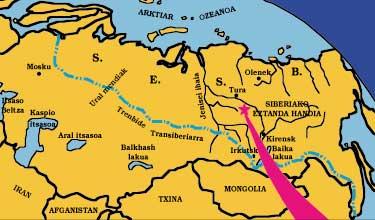
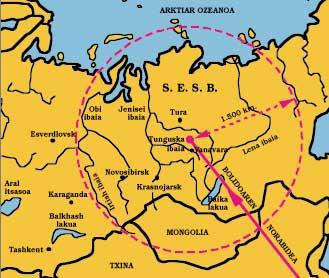
These are some of the testimonies of one of the great enigmas that have occurred in the modern era on our planet at dawn on June 30, 1908.
Consequences of an apocalypse
The direct consequences of this event in the Siberian country of Tunguska could be seen in many places. The collision caused an imposing column of fire that became spectacular in a radius of 200 kilometers. At the same time, there was a terrible coniferous storm, extending its noise to a thousand kilometers. The studies carried out by scientists confirm that the power of this explosion was equivalent to 500 atomic bombs like those launched in Hirosim.
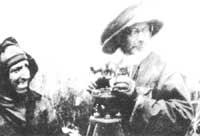
At the same time of the explosion, thousands of taiga trees were destroyed. The living creatures and the surrounding buildings were annulled and the crystals of the Ferrocarril Transiberiano station, located 600 kilometers away, moved due to the force of the wind. The vibrations reached Saint Petersburg, capital of Russia, and in Germany vibrations were detected produced by the crash at 5,000 kilometers.
The shock of the mysterious object uprooted the earth up to 20 kilometers in height, where it molded a wide cloud. As a result, in many areas the Sun was turned off and a terrible black rain began. In the Black Sea appeared in the coming days high-rise silver clouds and violent light spread everywhere. In some places, photos could be taken at midnight. These clouds began to turn around the Earth and through the light reflected by the dust, also in London itself, located 10,000 kilometers away, according to witnesses, a new fashion arose: read the newspaper at night with the existing light.
But, what was able to produce such disasters and atmospheric transformations? What was behind this terrible phenomenon?
Home expeditions Expeditions
Tunguska, in the center of Siberia, is one of the countries farther away from Tsar Nicholas II. In that country only deer and deer lived. This commercial territory was an unexplored area and also very difficult to reach, since throughout the year it remains icy. On the other hand, the political and economic problems of the tsarists were important. Therefore, it is no wonder that for twenty years, that mysterious event has not been investigated.
But in 1927 the Academy of Soviet Sciences carried out an important expedition Leonid A. He managed to organize under the orders of Kulik. This was full of curiosities through the information read of the event. According to this, that mysterious object moved vertically for ten minutes, adopting the shape of a cylindrical form.
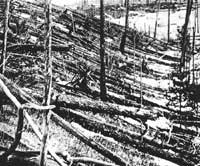
Driven by these strange information and with doubts about the capacity of a meteorite to provoke this type of catastrophes, for five years it accurately marked the position of the shock and spoke with most witnesses of the event. By 1927 he had defined his place. The center of the mystery was located 65 kilometers north of the village of Vanavara.
Then, Kuli went there with a citizen who witnessed a terrible explosion. When they reached the place, what they saw there shocked the geologist. In a radius of thirty kilometers everything was exhausted. The forest was completely dismantled and all the trees were on the ground looking at a certain sense. Hundreds of small craters were found, but surprisingly, neither the large crater nor the smallest trace of the meteorite appeared. Kulik made photographs of which he is one of the most famous and which appears in this article. In it the taiga trees appear oriented to the ground, as if a giant had pushed them together.
Kulik's expedition provoked great excitement among the researchers and curiosity. Since then the mystery of Tunguska has spread to the whole world, whose echoes have come to this day.
The bold theory to make understand the phenomenon unlikely
One of the most exciting questions that arise when you reach this point is: Through what process can the huge cataclysm seen in Tunguska be created? The question is important because the disaster that has occurred has been the largest in history. Remember that its effect was as large as that of 500 atomic bombs. It is not easy to point out what kind of mechanisms can release this type of energy. On the other hand, if we take into account the time when it happened, it was not created by man, since at that time atomic energy was not yet known. Where, therefore, to seek answers?
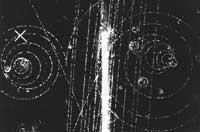
In 1941 a scientist from the Department of Mathematics at the University of Ohio published a curious and unlikely theory. According to this, the Earth was hit by an anti-maternal meteorite. The direct consequence of the collision was the enormous release of energy and the disappearance of the same meteorite in the process. Therefore, no meteorite remains have been found. This curious theory, which could be crazy a few years earlier, had a great success, since a few years earlier physicists demonstrated the existence of the first antiparts.
But to correctly understand this story, we must first travel to the year 1930.
The fascinating universe of antimatería
XX. In the early years of the twentieth century two important theories revolutionized the vision of Nature. The first was Albert Einstein's Theory of Relativity and the second was called Quantum Mechanics. Both are necessary to understand the new cosmos that was being revealed before science, but among them there was no solution.
The image of the Theory of Relativity on the universe is continuous. Not so Quantum Mechanics, since the system used to describe the world is discontinuous. There were many attempts to unite both theories, but in vain. One day came an unexpected success. The British researcher Paul Dirac was the one who received this honor.
In 1930, Dirac published a famous work that allowed him to unite the two aforementioned theories, endowing Physics with great coherence. The essence of his theory was an important formula. But this formula not only solved many problems but also revealed new ones.
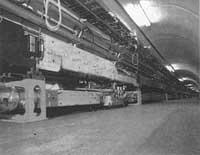
This formula explained two different worlds. One was the positive universe that we lived and the other a negative world that for us fostered the stranger and the imagination. And in the formula of Dirac both worlds were mathematically possible.
In the negative universe, for example, all objects would have a negative mass, which means that, pushed by them, they would move in the reverse direction. In such a curious universe, an object moving forward should be pushed back and pushed forward to slow down. Of course, this world was only a mathematical option, with no relation to reality.
But Dirac did not stop. With the courage and conviction that the formula adjusted to reality, he affirmed that in Nature any particle should have a negative companion. These members, known as antiparticles, were not known in 1930 because of the limitations of science. But as experimental physics progressed, Dirace firmly believed that they were being discovered and detected.
A mysterious and incredible page of the cosmos of physics was spreading. What would the future offer?
Discovery of the antielectron
In 1930 three subatomic particles were known: the proton (of great mass and positive load), the neutron (of great mass and without load) and the electron (of small mass and negative load). From these three particles, we built the ato mos of all the elements. And on these atoms, matter.
Thus, and only two years after Dirace formulated his hypothesis, the world of physicists was strongly shaken when an important discovery occurred.
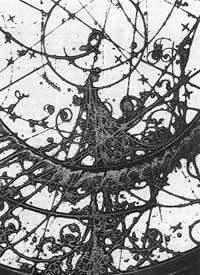
In 1932, the American physicist Carl Anderson explores the remains left by high-energy electrons in the fog chamber. Suddenly, surprised, he sees that half of the electrons passing through the chamber are diverting to the right and the other half to the left. This means that half of the electrons have positive charge and the other half is negative, so the magnetic field of the camera encourages them to describe two different symmetric trajectories.
The discovery of the positive electron quickly spread to all laboratories on the planet. And the scientific world, overcoming its unbelief, had to recognize the existence of the antiparticle corresponding to the electron.
With the same tests carried out in different laboratories, the same conclusion was obtained. A positive/negative electron is obtained which, if generated, destroys each other (there can be no matter and anti-mating) irradiating energy. The success of these experiments encouraged physicists to look for antiparts theorized by Dirac and not yet found.
He began the hunting of the antimatería.
Antiproton and antineutroia between us
It was much more difficult to find the antiproton. The reason is its great mass. The mass of the antiproton is 2,000 times higher than that of the electron, which means a very high energy. With the aim of achieving these great energies, both in the United States and in the USSR, specific research programmes began to be prepared with a single objective. They were looking for high energy accelerators.
In this attractive history we are already in 1955. Two or three years have passed and they have built a special machine at the University of Berkeley. Under the name of Betatroi, researchers believe it will be possible to obtain an antiproton through it, if the antiproton exists, of course.
They have immediately begun to experiment and scientists involved in these experiments have discovered that at the exit of Betatroi have appeared negative particles. Measuring the mass of these fractions have shown that they are 1.840 times larger than that of the electron, than the mass of the proton. There is no doubt. If they are negative protons and have been artificially obtained in the new machine! News News News
These protons, as predicted by the theory, have exploded by coming into contact with common matter, expanding energy in all directions.
Thanks to success, these special supermachines have begun to hunt and catch antineutroi. And in 1956, without problems, the antineutroi has also been detected.
Birth of the antiatoms
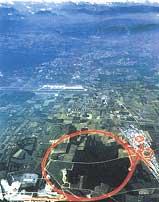
The discovery of the aforementioned antiparts was a success for experimental physics. But if one takes into account the complexity of the matter, the road to the antimatería was full of thorns. The first step in this difficult road was to get the antiatom. And, of course, the simplest atom that could be created was hydrogen. This happened in 1965.
That year an important page of the history of science was written in the National Laboratory of Brookhaven. It was the place where the antiatom of hydrogen was first obtained, since the antiproton and antineutroia were united inside. The steps taken from there were as tremendous as fast. In 1970 the team of the Soviet physicist Yuri Prokoshkin obtained in his laboratory more than 50,000 cores of antihelium. Let us remember, in terms of complexity, that helium is the next atom of hydrogen.
Seeking antimatency
And while the research continued in the laboratories of the Earth, in the heads of the sciences a question began to be modeled. Why not exist the anti-mating of any particle? So, where can we find that anti-Maternity, that anti-Ism?
On our Earth it is clear that the existing matter is the common matter. If not, the contact between antimatter and matter would provoke an explosion of vertigo, making all the environment disappear. Likewise, in the case of our galaxy, the same reasoning could be made. Today, in our galaxy, the so-called Milky Way galaxy, it does not seem that the anti-mating of matter is in the process of extinction, since in no case are the enormous energies that would have originated by this type of situations detected. We can say, without a doubt, that our galaxy is made up of ordinary matter.
But, why does the process that is not in our galaxy not occur in other distant galaxies? This question was shaken a few years ago when the galaxy called NGC 5128 was detected and analyzed.
Given the distance this galaxy has to us and the energy it sends, today's astronomers and physicists don't know how to explain it, because the energy it emits is huge. After more calculations they reached a surprising decision. This galaxy would only be possible to produce so much energy emission if all the matter of the galaxy was in the process of disintegration. But, with what mechanisms can the whole galaxy be disintegrated?.
Almost naturally came the theory of shock among astronomers. According to this, if a galaxy of antimatería met another galaxy of matter, it would disappear by a terrible explosion and then the enormous energies that our telescopes perceive would be possible. This could be the process that was taking place in the so-called galaxy NGC 5128. But, how do we know that this theory was true?
The galaxy test came when they began to study optically. The galaxy called NGC 5128 is spherical and taking the photo could be seen that its diameter was darkened from right to left. Another laun galaxy appears lateral view, cutting the spherical as a sheet. Why not suppose that a laun galaxy of antimatería is cutting the spherical galaxy NGC 5128?. In this process, the stars of these two galaxies would be disintegrating, sending huge energies into the cosmos.
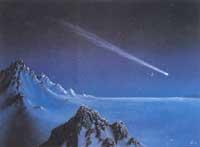
For a time many astronomers accepted that they were seeing the cosmic crash of two galaxies molded by matter and antimating. However, this theory did not last long and at present appears another alternative theory that explains the enormous energy sent by the galaxy NGC 5128. In addition, we have been able to know that the dark line that appears in the center of this galaxy is no other galaxy, but the cosmic dust that is collected in the diameter of the same galaxy.
Impact of an antimaterial meteorite
Yes! News This was the hypothesis that some scientists proposed to clarify the cause of the gigantic explosion of Tunisia. According to this theory, an antimaterial meteorite circulating through space penetrated the gravitational zone of the Earth. Then, when he touched the atoms of matter (especially those of the atmosphere) he burst out completely disappearing and creating a great cataclysm in his underlying territory, the taiga of Tunguska.
In favor of this theory is the fact that the meteorite has not found the largest crater at all, as if the object that caused the explosion had no contact with the earth. The theory of antimatería overcomes this obstacle and can be credible. But he meets other obstacles. The first and most remarkable is the no detection of antimatería in the universe so far, although in our laboratories have obtained some nuclei of antimatería of simple atoms. Where could this type of meteorite come from knowing that the planets of the solar system are matter?
The second obstacle is that in the explosion of two objects of matter and antimatería, in addition to the disappearance of the matter, in the place where the event occurred, there should be a great radioactivity, which has not happened in Tunguska.
Therefore, for these two reasons, although not totally discarded, the theory of antimatería has been replaced by other altenative theories. One of them can be much more fascinating than anti-mating. This theory says that the explosion of Tunguska could be a process provoked by a black hole. But what is that black hole that can generate such a terrible cataclysm?





